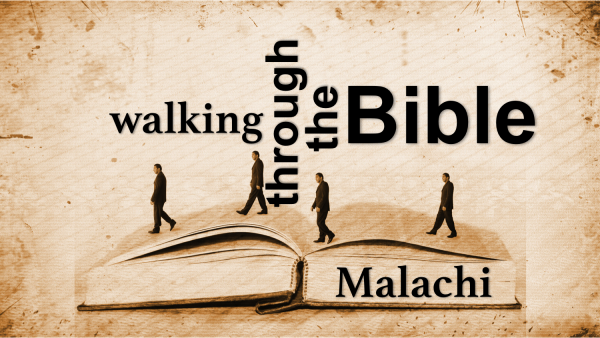There is nothing known of Malachi the man other than he was of the writing prophets, but a great deal of insight into his character and commitment is seen through the theme and outline of his book. Keep in mind that at this point the Messiah was but some four hundred years away from being born. Though Malachi likely did not know that, God who inspired him to write did, and this was His final written effort at reorganizing His people after righteousness. The topics then would be broad but bold and intended to persuade the people to once more fear God and keep His commandments (Ecclesiastes 12:13).
It is with this in mind the Malachi goes about in a three fold manner to instill faith and a thirst for righteousness within the people. First, in Malachi 1:1-5, the prophet reminds them of God’s love. It seems every prophet made God’s love a prominent theme in their books, and for good reason. A people needs the assurance and stability of His love to motivate them to do what is right even in the midst of what is wrong. That is exactly where Israel has found herself. Good changes had taken place since their return from Babylon, but there still was a sense of indifference and laxity among them. Verse two simply states, “I have loved you..” If the love of God was not enough to motivate these people toward action then nothing could.
Second, Malachi gets to the business at hand of assuring them that even though God loves them He would not commend their present state of unrighteousness. Sin had been committed and it need to be changed. Thus in Malachi 1:6-2:17 the prophet charges the people with sins that were religious, moral, social, and material. These sins began with the corruption of the priesthood, and with the leadership given to evil it did not take long for it to filter down to the rest of the people. Dunn cites that:
“These included marriages with heathen (2:11; Nehemiah 13:23-27); profaning the covenant of the priesthood (2:8; Nehemiah 13:29); and robbing God of tithes and offerings (3:10; Nehemiah 13:10-12). Malachi also condemned them for failing to honor God (1:6), for offering polluted sacrifices and corrupting the sabbath (1:7-8), for wearying God with their hypocrisy and vain words (1:12; 2:13,17), for priests causing others to stumble (2:8), for the people’s turning aside from God’s law (3:7), divorcing their wives (2:14-16), saying it is vain to serve God (3:14), calling the wicked happy (3:15), and other sins (3:5).”
Essentially then, there had been little change religiously, morally, socially, and materially throughout the last 1,500 years among this nation except for the worst. In response to all of these sins, Malachi tells the people God will act.
It is, then, presented in the third place, a message of hope. This too is a common theme throughout the prophets because even in the midst of sin, the people are assured that God has not forgotten His promise and that it will be fulfilled in time. The only variation between Malachi’s message of hope and that of the other prophets is that the others’ focus solely upon Christ, and Malachi promises Christ and the one who would come before Him. It is in Malachi 3:1ff that the prophet makes reference to a messenger who would be sent to prepare the way for the Lord. This would refer to none other than John the Baptist, the voice of one crying out from the wilderness saying, “Prepare ye the way of the Lord, make his paths straight” (Matthew 3:3). John accomplished that for his cousin and Lord, whereby Christ came to take away the sins of the world. It is through John’s coming that Christ promises His coming as well. After John came, so would Christ and all things prophesied by John would come to pass. Christ’s marvelous presence in Malachi reaffirms among the children of God the promise of One who would deliver the people from their sins.
This three-fold message is one universal in application, for unto all is the love of God manifest. Sin remains a problem, but by providing the message of hope, many can and will be snatched from the fire. God utters through the ancient pages of scripture unto all “I have loved you.” Can we say the same to Him?

